Episodes
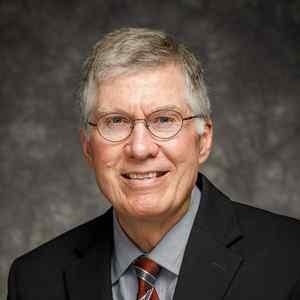
Monday Feb 04, 2019
Episode 045 - Daniel Hinshaw and the human microcosmos
Monday Feb 04, 2019
Monday Feb 04, 2019
Today we start a two-part series with Daniel Hinshaw, a professor emeritus of surgery at the University of Michigan, who has come to focus on palliative care for the dying. He sees his work as having deep roots in the Christian tradition, and has written on the subject of "kenosis" (the Scriptural concept of "emptying" or "reduction" or "wasting away" that is key to our understanding of the Incarnation and the Passion of Jesus Christ) as a useful concept for understanding our own mortality, at the scale of our individual cells as well as our whole composite being.
He shared some interesting spiritual perspectives with us. As someone who in his mature years moved from the Seventh Day Adventists and sought out the apostolic churches, he now belong to the Orthodox Church. We spent some time discussing the "microcosmos," John Chrysostom's idea that the human being contains all creation in miniature, and how that is oddly true in certain respects: we are each communities of organisms. Our gut microbiome, for example.
Daniel went on to talk some heavy duty biochemical shop. We discussed the oxidizing agents (e.g., hydrogen peroxide) involved in inflammatory ailments. He touched on the fact that some of the worst chemical warfare agents, like sulfur mustard gas, operate in a similar oxidizing mechanism, triggering apoptosis, and discussed some of his work on finding remedies for these agents, as well as how similar they are to the earliest generation of chemotherapy agents.
We shifted back to the question of faith, and discussed how both Daniel and his wife confronted suffering in their work (his wife as a psychiatrist treating AIDS patients in particular) and this was a core part of their journey. Daniel pointed out the provocative fact that we really seem to be programmed to age and die, and that the only exceptions to this... are cancer cells.
Another moral point we discover in modern biology has to do with epigenetics. As human beings, we can abuse our bodies to the point that we leave effects on our germ cells that can carry on the "sins of the father" to future generations.
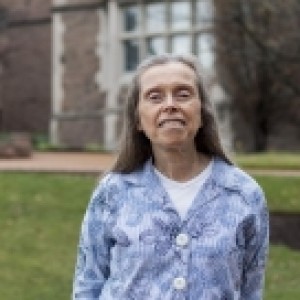
Monday Dec 17, 2018
Episode 038 - Jill Pasteris: Uncertainty and Faith
Monday Dec 17, 2018
Monday Dec 17, 2018
0:00 Experience as a Christian scientist
1:00 The billion year contact; awe
2:00 Awe and the vast scale of Earth science
3:00 Discoveries never shake faith
4:00 Evolution, randomness, the shortage of provable things
6:00 The bureaucratic mindset: certainty and judgment
7:00 Yucca Mountain, studtite, and uranyl peroxides (Peter Burns, Karrie-Ann Hughes)
8:00 Uranyl chemistry
9:00 Guy Consolmagno's thought experiment on planetary atmospheres
10:00 Uranyl peroxide buckyballs...
11:00 NOT in the initial fate and transport model for Yucca Mountain
12:00 Real life is lack of certainty
13:00 Where we'd put uranium if we had to...
14:00 Hanford, Washington and uranium migration
15:00 Phosphates as immobilizers
16:00 Humans and squirrels: digging stuff up to bury it again
17:00 Kirby Runyon
18:00 Difficult conversations
20:00 The Bible
21:00 Cyclic nature of human history, scriptural history
22:00 The second millennium history of reaction, after reaction, after reaction against hypocrisy
23:00 Secularism and the irreligious right
24:00 Progressive movement as a para-Christian critique of society
26:00 Modern psychology and spirituality:
Fulton Sheen's image of the psychologist pulling Christian truths out of the garbage can
and passing them off as discoveries
29:00 The need for God
30:00 Companions on the way
31:00 Providence

Monday Dec 10, 2018
Episode 037 - Jill Pasteris: Christian scientist
Monday Dec 10, 2018
Monday Dec 10, 2018
3:00 Jill's career
5:00 Finding companionship as Christian scientists (not Christian Scientists...that's different...)
7:00 "Spiritual beings having a human experience"
8:00 Bioapatite; clearing up "loose ends" making a 20 year career arc
9:00 Apatite and phosphate: environment
13:00 Flint, Michigan: lead and protective minerals
14:00 Raman spectroscopy
16:00 Raman on the Mars 2020 rover; Alian Wang
17:00 Laser pointers, cat videos [the brave new world we live in]
18:00 The physics of Raman
19:00 Why lasers and Raman went hand in hand
20:00 Rayleigh vs. Raman scattering
21:00 Raman spectra
22:00 Raman: a (usually) nondestructive technique
23:00 The lecture example and the ease of sample prep for Raman
25:00 Raman peak heights and thermodynamics
26:00 Fingerprinting vs. understanding
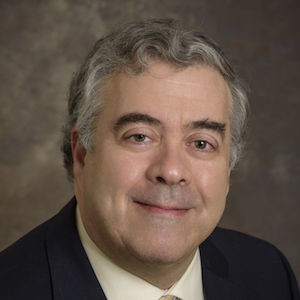
Monday Nov 19, 2018
Episode 034 - Stephen Barr on Why to Be a Religious (and Catholic) Scientist
Monday Nov 19, 2018
Monday Nov 19, 2018
~0:00 Question: advice for students
1:00 Don't be afraid to be a religious scientist
2:00 Particular issues
3:00 Keep awake to the wonder of the world
4:00 Bill: ignorance of the common man about both science and religion
5:00 Modern Physics and Ancient Faith
6:00 Christopher Baglow: science and faith textbook
7:00 Church beginning (at long last?) to address the need to catechize & educate about this
Phone ringing can't be excised without gutting Bill's question!
8:00 Media's portrayal of religion as boring and science as exciting
9:00 Science explores the world as it is, but there must be issues beyond: "why" issues
10:00 Intellectual freedom necessary for science to make any sense
11:00 No reason for Catholics to fear science uncovering fatal problems for faith
12:00 20th century overturn of 19th century mechanistic, unfree universe
13:00 Advent of the big bang theory, verification through microwave radiation
14:00 Bill: "free will on steroids" in uneasy coexistence with materialism
15:00 Barr: inherent conflict there
16:00 Pernicious recurring feature of intellectual history: excuses not to be free
17:00 Bill: does faith make one a better scientist?
18:00 Wonder: "ears to hear and eyes to see"
19:00 Summation: join Society of Catholic Scientists!
20:00 Sign off

Monday Nov 12, 2018
Monday Nov 12, 2018
Minute Comment
0:00 Paul introduces
1:00 Bill: Lemaitre announcement
2:00 Lemaitre: faith & science not opposed
3:00 Barr: Lemaitre announcement
4:00 Ignorance of Lemaitre
5:00 Ignorance of the Christian, Catholic origin of science & famous Catholic scientists
6:00 Barr: late 19th century critical period for the forging of the myth of Church as anti-science
7:00 Science only professionalized in the late 19th century, looking for influence
8:00 More famous Catholic scientists
9:00 Mission of the Society of Catholic Scientists; religious people looking askance at scientists, 10:00 Scientists timid about showing their faith in the presence of a few loud atheists
11:00 Catholic scientists joining SCS & finding others like themselves
12:00 Witness to the world
13:00 Conferences, past and future: next June at Notre Dame
14:00 2017: origin of universe, life; 2018: mind and matter
15:00 2019 conference: what is it (and has it been) to be human; speakers from outside the faith
16:00 Past non-Catholic conference speakers
17:00 Peter Koellner's talk at 2018 conference
18:00 Koellner and Godel's theorem
19:00 Neaderthals, language, reason
20:00 Godel's beliefs about mind and mathematical truths
21:00 Mathematical truth and religious truth
22:00 Depth & sophistication of the law that governs the universe
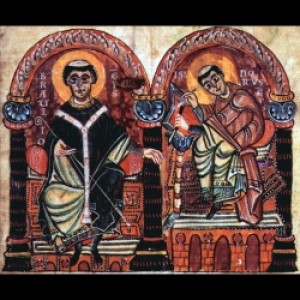
Monday Nov 05, 2018
Episode 032 - Science and Saints
Monday Nov 05, 2018
Monday Nov 05, 2018
Intro: Nobel Prize announcements
Donna Strickland
Nadia Murad
Segue: Lemaitre press release
Transition: the early 20th century golden age from Chesterton to Fulton Sheen
Theme: All Saints Day
Augustine
Isidore
Albert the Great
Roger Bacon
Nicolaus Steno
Gregor Mendel
Georges Lemaitre
Please leave us feedback here by hitting the "Email Paul" link or using the "Facebook" link and commenting or messaging us there.
Image: Braulio of Saragossa and Isidore of Seville, writing his Origins (Etymologies)
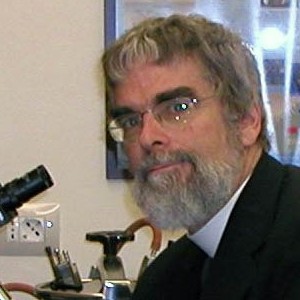
Monday Oct 22, 2018
Episode 030 - Br. Guy Consolmagno: Galileo and Carl Sagan
Monday Oct 22, 2018
Monday Oct 22, 2018
Br. Guy starts with a brief bio of himself as the meteorite curator and now director of the Vatican Observatory. If you aren't familiar with his life and career, I cannot suggest strongly enough to go find a copy of Brother Astronomer. Paul takes the opportunity to geek out a bit about the VO's collection of Martian meteorites, which includes pieces of varying size of the three flagship members of the three great classes of Martian meteorites: Chassigny, Shergotty, and Nakhla. We discuss the romance and suspense of finding meteorites in the dry deserts.
Paul then poses the question of the recently discovered Galileo letter. Br. Guy defuses a bit of the noise surrounding this letter, likening the situation to scientists down to this very day putting out provocative theses and then pulling them back under criticism from their peers.
(My dog Riley starts barking at UPS personnel sometime between 13:00 and 13:30. This was an eventful session.)
Galileo in his time was rather like Carl Sagan in his time: a popularizer and a controversialist. Br. Guy, who met Carl Sagan a few times, recognizes the value that both of these controversial figures brought to the field. He goes on to discuss the travails that Sagan faced in his own life, dealing with fame and the risks he ran to get his message out (the massive debt he incurred in making Cosmos) and notes his own fraught relationship with his own faith.
Carl Sagan was a serious scientist, in the 1960s one of the first to grapple with the unexpectedly, incredibly hot temperatures the first Venus probes reported and to link it with the very thick carbon dioxide atmosphere Venus has.
Br. Guy talks a little about his experience "coming out" as a religious believer, and the opposition he _didn't_ receive in publicizing his decision to become a Jesuit. He moves on to discuss the romance of science, why we're attracted to it, and why it's important to steer a middle path (that Aristotelian mean again) in both science and faith between "I already know everything worth knowing" and "God / the universe is so big I can never understand it." Of course you won't learn it all, but of course you'll be able to learn and love something. He likens it to a good friendship or romantic relationship, in which you rejoice in both the known and the unknown.
Paul probes Br. Guy on whether Sagan influenced him in his own popular books. Br. Guy professes that not only did Carl Sagan influence his confidence in being able to discuss the wonders of planetary science and astronomy with a popular audience, as well as his colloquial tone, but even his wardrobe served as a good precursor (compare Carl at https://www.imdb.com/name/nm0755981/ with Guy at https://www.radiokerry.ie/portraits-of-gc36-delegates/ and for good measure another great Italian scientist who wore the collar well https://www.torinoscienza.it/personaggi/giuseppe-mercalli).
Image courtesy Robert Macke (wikimedia Commons)

Monday Oct 08, 2018
Episode 028 - Absolute Geologic Dating
Monday Oct 08, 2018
Monday Oct 08, 2018
In this episode we continue into the next logical topic, absolute dating, which is done via measurement of radioactive parent and daughter isotopes. Thus we move from the 19th century and classical physics into yet another way in which 20th century physics has revolutionized science.
Paul gives a rundown, with many apologies for the exact data of isotope numbers and half-life lengths he has managed to forget, of the theory of radioactive decay. Bill, our proxy for the man on the street, starts us off with a common notion of half-life. From there we cover some of the basics and most commonly used isotopic systems: uranium-lead, thorium-lead, a discussion of why carbon 14 is so seldom used in geology, potassium-argon, and a note that more systems are always being brought into use. We discuss the distinct types of rocks that are best used for radiometric dating and how the relative dating methods have to be used in an interwoven system with radiometric dating in order to assemble the whole system of geochronology that we use today.
We end the podcast with a discussion of how science is the very opposite of a conspiracy theory or a political campaign. The geologic dating systems need interlocking data, and they also benefit from it. In such a system, contradictions do spring up--one study doing biostratigraphy might conflict with another using zircons. What science does is not to sweep that under the rug...instead we throw resources and graduate students at it until we get a resolution to the conflict.
(Zircon photo credit Harald Schillhammer via mindat.org. Note the pink and brown coloration...brown zircon is commonly that color due to radiation damage from the uranium and thorium it contains.)
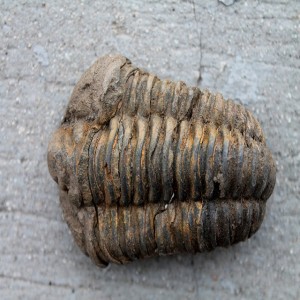
Monday Oct 01, 2018
Episode 027 - Relative Geologic Dating
Monday Oct 01, 2018
Monday Oct 01, 2018
In this episode Paul lays out in a more systematic way the methods used in geology since the late 18th century to erect the detailed stratigraphic history of the Earth. Lithostratigraphy, which works via Steno's Laws, can be used on all the rocks in any outcrop. Its shortcoming is that it cannot be extended beyond a regional scale, at best--say, the state of Wyoming, or Wales and Corwall, etc. Biostratigraphy, the use of fossils, which includes the selection of specially suitable index fossils, allows correlation of strata across continental, oceanic, and worldwide scales. However, not every rock--not even every sedimentary rock--is a good home for fossils. It is only by the use of both methods in tandem that a complete relative geologic timescale has been assembled and erected.
You will note that in passing I mentioned that the idea of extinct organisms was difficult for European scholars, specifically, in the 17th century to accept, and then I go on to give you a tell by speaking of Renaissance "gurus"...of course, I mean to contrast European thought with Indian thought, in which the idea of extinct organisms is not so hard to fit in to an idea of long, cyclical histories of periodic destruction and remaking of the Earth and universe.
Two specific points: One, the word evolution contains a lot of conceptual components. What we are discussing in this episode, what is almost beyond realistic controversy at this point, is what I would term "succession of species." Matching sequences of fossils, in their relative age relationships as indicated by Steno's laws, recur in innumerable outcrops across the Earth. (I note in passing that an all-knowing Creator building this out of nothing in instantaneous creation must assuredly have known that this would deceive human beings eventually into thinking that there was a succession, and then you have to deal with the intellectual baggage of God deliberately lying to us.) That is different than the mechanism by which this succession of species was made to occur: inheritance, survival of the fit and extinction of others as environment and competition varied with time, mutations, viral transport of DNA, and whatever else actually caused this succession of species. That is less clear.
Two, the early workers in stratigraphy (especially the British ones) by and large wanted the Biblical narrative, and even the Biblical minimalist narrative to work out. The evidence forced them out of this interpretation. To reiterate the point from last episode, there was never a conspiracy to submerge the Bible story of creation and Noah's flood: the cycle of observation, reflection, and criticism of ideas killed theories depending on excessively broad interpretations of the Genesis text.
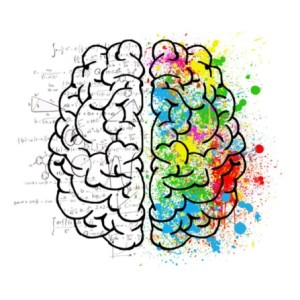
Monday Jul 16, 2018
Monday Jul 16, 2018
Dr. Scarani opened the talk by noting a paper he placed on arxiv.org about Aquinas and the sense that the universe would not be perfect without randomness.
He moved on to discuss randomness in two senses: Process Randomness, which implies that there is an observer unable to predict the output of the process; and Product Randomness, the lack of structure of a product, which turns out to equate with the need for a very long algorithm to replicate the product. Products are tested for randomness by a battery of statistical tests. He gave an equation embodying a mathematical definition of [product] randomness. Not being an information theorist, I had not seen it before.
He went on to note the difference between the randomness of classical physics, which is always about a lack of complete information about a system. If one had that information, the system under the classical assumption would be perfectly defined, and as we have noted a number of times, Einstein among others desperately wanted to get back to that deterministic paradigm. "The Old One doesn't throw dice."
The core of the talk was what Scarani called a "high school level" presentation of Bell's theorem. I would like to meet the high school student who could follow it at the speed at which he gave the talk, but probably could have unpacked it given a couple of hours to do so even at that age. Bell's theorem is one of those cunning little mathematical gems that seems to prove the unprovable, namely, to make a prediction about something going on in a process one by definition cannot see into. Bell sets up a statistic that, if there are hidden rules governing physics below the scale at which the uncertainty principle lets us see, must nevertheless in real experiments end up being less than 2. Since the 1980s a series of ever more careful experiments have been done, and the answers in the papers Scarani reviewed had answers between 2.4 and 2.7; the answer is never below 2. According to Bell's theorem, this means that there is a really random process going on down there, and not just random products.
At the end, as we discuss in the audio, Scarani ran down the list of remaining possibilities for understanding the quantum foundations of the universe:
- There is real randomness.
- "Superdeterminism." This depends on breaking an assumption of the Bell theorem, which is that the quantum process is being fed input that itself is not really random from the perspective of that process, which would seem to imply some sort of physics puppet master controlling the experimenter.
- The many worlds hypothesis, again something we have mentioned a number of times. I am still not buying that stock.
- The only allowable sort of hidden variables (the name Bohm is attached to the most commonly discussed of these) would require particles communicating with each other at infinite speed, "deliberately" trying to wreck the experiment, and with the interaction hidden in a way workers in the field have called "conspiratorially hidden." I.e., we would be living in a universe run by a sort of Cartesian evil deity.
On that theme, note that I blundered off into talking in a sort of Cartesian dualist fashion about the relationship between soul and body there after the 14 or 15 minute mark.

